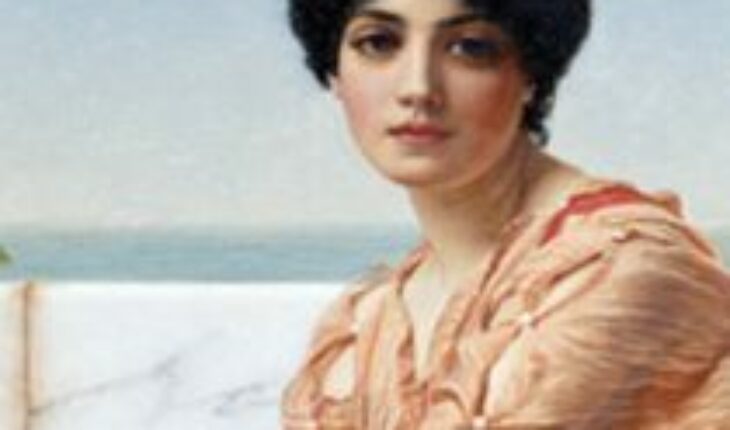Let’s go back with Sappho from Lesbos to our Banquet of Love with Ancient Women. It was his turn to tell us about love and what he had written 27 centuries ago about it. He dressed simply with his white linen cloths crossed to his ankles. He brought a lyre, similar to a small harp, with only 5 or 7 musical strings. Sappho was a lyric poet, her poems sang by playing the lyre, expressing personal and deep feelings and emotions.
Sappho took his lyre, stood up and as he played told us something personal. – It bothers me that for so many centuries I have been absurdly and unjustifiably disqualified for my bisexuality and lesbianism. What does that matter! They have concentrated on that cheap gossip and not on my poetry, which was so recognized by many including Plato that he declared me the tenth Muse. And why do I have to be the icon of lesbianism, if I was really bisexual? I could practice lesbianism and I did it a lot, like heterosexuality. But that has distracted from my poetic work. And Socrates? Why didn’t they transform Socrates into the icon of homosexuals? He was also bisexual and practiced homosexuality. Moreover, the people of Athens brought him to trial accusing him among other things of “corrupting the young” and ungodly, and gathered about 500 free Athenians condemned him to death. I think that perhaps Socrates was also condemned deep down out of envy and because he used the irony that affected those who thought they were wise.
At that moment of the conversation, Aspasia, who was present at the banquet, stopped Sappho and said to him:
– Please Sappho, don’t mess with Socrates! I was the one who taught Socrates about love when he was still very young, and I will have my turn to speak and explain that thought about love. But you didn’t mess with him, nor did you know him! “I understand your rage Sappho,” Aspasia added, “but if the same thing had happened to Socrates that happened to you, probably the gossip, his homosexual loves and practices with his lovers young men would have overcome and overshadowed all the greatness of the philosophy of the great Socrates.
Enheduanna, the oldest, looked at this discussion between Sappho and Aspasia undeterred. He wanted to calm the spirits, barely hinted at raising his left hand and everyone fell silent. Said Enheduanna, “I have not come for 4,300 years to this Banquet of Love with Ancient Women, to witness inconsequential disputes between remarkable women. If you want women to occupy the place we aspire to and deserve to have, we must stick together and go to the substance we can contribute. Then he delicately placed his right hand on Sappho’s for a few moments, without saying a word, and Sappho was filled with peace.
Sappho continued, but in a calm voice. -Do you know what happens Enheduanna? Since I wrote my poems and they were collected in nine books 27 centuries ago, no less than 1,600 years have passed since then, and in 1,050 A.D. Pope Gregory VII apparently only learned that I was bisexual and therefore practiced lesbianism. And you know what he did? The Pope ordered all my work to be burned! The nine books! Complete! That is why what is known today of my poetry are only fragments, lines, words, and a couple of complete poems. Enheduanna exclaimed: What barbarity, for all the gods! And then Sappho added: Can you imagine if Gregory VII had applied the same rule to all those books written by philosophers, theologians, poets, writers, monks, scientists, religious men and women linked to the Catholic Church, who were homosexual, lesbian or bisexual, whose books are in the Vatican Library? Maybe he should have burned half of the library! I would never have wanted that, nor do I justify it, I would consider it barbaric, I would condemn it. But if Gregory VII had applied the same rod, that is what he should have done.
What a terrible end to your work Sappho! I told her, to calm her down. It’s touching when you hear your poetry recited today. It is barely a line, two words separated by ellipses, a small paragraph, despite which they are great, really beautiful, each word or line by itself has an enormous depth. I also think there is something very unfair about what happened to you, because the vast majority of philosophers and poets of Greek and Roman antiquity were bisexual or exclusively homosexual. It was an absolutely common, normal practice. Their lovers were young men, in turn they had their ladies inThey were locked in their home and also had female lovers outside of them. That is, in those glory times of philosophy, ethics, politics and poetry, every Greek at least had a Ménage à trois.
But we want to hear your poetry about love!
Sappho took his lyre again saying “Ea, divine lyre… Sonora…!” and played delicate music with his fingertips. The first thing he said was: -“The most beautiful thing is what one loves”. “Originally I did not say it directly,” he added, “but in a poem comparing it with the beauty of military and naval affairs, which were considered at that time very beautiful. My statement that “The most beautiful thing is what you love”, was a main idea of mine that marked a difference with respect to many other thinkers and poets of antiquity. There was an eagerness at that time to determine what was the most beautiful, or the best. Some said it was fair, others happiness, or good, some unusual like Pindar said it was water, and another that the best thing would have been not to have been born. “For me, on the other hand, “The most beautiful thing is what you love.”
And she continued singing her immortal Ode to Aphrodite, which is a plea from Sappho for the goddess to help her conquer an elusive love and Aphrodite answers. He sang to us the final part of the poem when Aphrodite replied:
“… And you, happy goddess smiling with your immortal face asked me what was happening to me and why again I call you / and what it is that in my crazy heart I most want to happen to me:”
Aphrodite replies: “Does your restless heart burn again? Who do I move this time to hold on to your affection? Sappho, who is it that wrongs you? / If he has fled from you, he will soon come looking for you; if he does not accept gifts, he will give them; If she does not love you, she will soon love you even if she does not want to, and when you dodge the fiery kiss, / she will want to kiss you.”
Spectacular! That poetry could be from the twentieth century. Having spent 27 centuries of evolution and growth of poetry, Safo has little or nothing to envy to our Neruda or Mistral. And do you see that suffering from unrequited love has been a drama of all time, including Sappho, an expert in love and seduction.
Then Sappho sang us another poem in which she tells how she also succumbed to the love of a young man and this caused her the “disease of love” that only allowed her to concentrate on that: “My sweet mother, I can’t work, / the spindle falls from between my fingers / Aphrodite has filled my heart / with love for a beautiful teenager / and I succumb to that love.” And then he sang of the bittersweet disease of desire: “Again Eros that unleashes the limbs makes me shudder, that sweet and bitter little beast, against which there is no one to defend himself.”
Finally, Sappho confessed to us that she felt love so intensely that it hurt physically. And he sang with his lyre: “It seems to me similar to the gods that man who is sitting in front of you and listening to you while you speak sweetly to him… and while you laugh with love. This has really made my heart faint inside the chest: for if I look at you at a point, my voice does not obey me, / my tongue is broken, a soft fire runs under my skin, I see nothing with my eyes, my ears ring, … sweat springs from me, a tremor takes hold of my all, pale as grass I stay and about to die I see myself./ But all things must suffer…”
Ugh! How wonderful! If you received a poem like that from Sappho or a friend, what would happen to you? I think you would feel almost the same as Sappho describes there and you would be about to die!
Follow us on
The content expressed in this opinion column is the sole responsibility of its author, and does not necessarily reflect the editorial line or position of El Mostrador.





